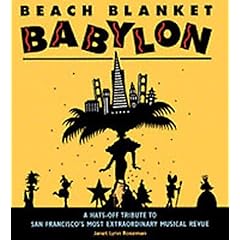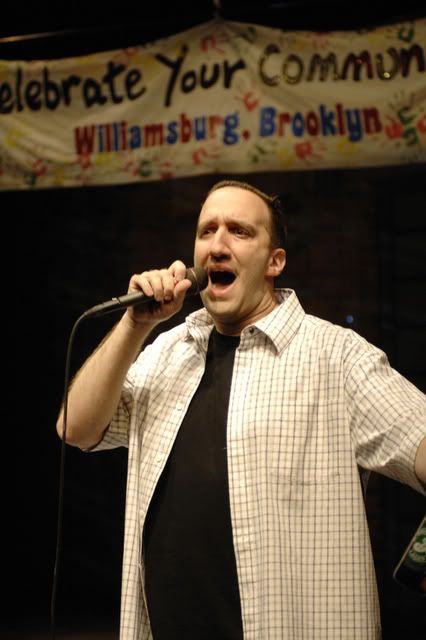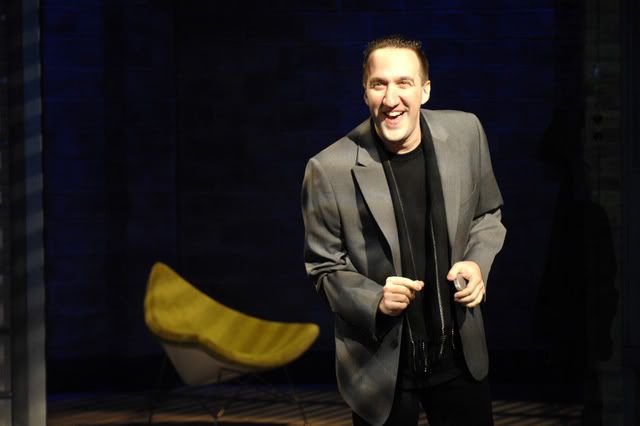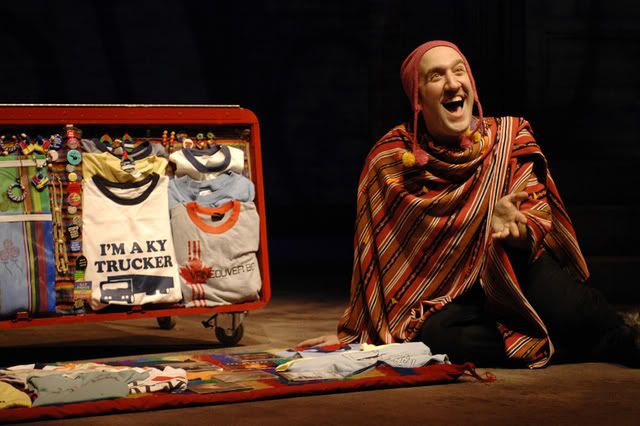
For Berkeley Repertory Theatre artistic director Tony Taccone, the most interesting thing about his company’s 40th anniversary season is the year 1967.
“So many organizations in the last year are celebrating 40,” Taccone says. “The late ’60s were a really fertile time. Things tend to start when people feel many things are possible. It’s a largely unarticulated feeling or thought, but they all feel or sense the possibility. That was a fecund time period, but it wasn’t about institutionalizing — more like let’s start something.”
Those pioneering ideas became active groups, and those active groups became features of the landscape. “Now we’re permanent in an impermanent world,” Taccone says.
Berkeley Rep was hardly an institution when Michael Leibert staged Woyzek at the International House on the UC Berkeley campus and then converted a storefront on College Avenue into an 85-seat theater to remount the show.
Twelve years later, Berkeley Rep opened its 400-seat Thrust Stage on Addison Street, and soon after, the company was one of the major players on the American regional theater scene.
Sharon Ott became artistic director in 1984, and Taccone joined the staff as associate artistic director in 1988. He took over as artistic director in 1997, the same year Berkeley Rep won the Tony Award as outstanding regional theater.
Taccone has been in the job 10 years now, and has seen his company expand from one stage to two with the 2001 opening of the 600-seat Roda Theatre next door to the Thrust Stage.
There were some significant bumps after the new theater opened — Sept. 11 being a major one — but Berkeley Rep is thriving.
“To be able to do a season like we’ve done the last few years — largely titles not familiar to the audience — and to be as healthy as we are, it’s really satisfying,” Taccone says. “To be successfully selling to a substantial subscription base, to be attracting new audiences and making a big increase in our younger audience, man that feels good.”
Opening a new theater is a tricky business both artistically and commercially. Taccone says he knew that the opening of the Roda meant his theater was embarking on what he thought of as a “10-year experiment to make this two-headed animal work.”
 “There’s a lot more possibility with two stages, but a lot more pressure in some ways as well,” he says. “We’re in year seven, and we’re on course. We’ve figured out a lot of stuff about the spaces and tried lots of things to test our working hypotheses. You learn. That’s been cool.”
“There’s a lot more possibility with two stages, but a lot more pressure in some ways as well,” he says. “We’re in year seven, and we’re on course. We’ve figured out a lot of stuff about the spaces and tried lots of things to test our working hypotheses. You learn. That’s been cool.”
With so much competition for an audience’s attention (and almighty dollar), Berkeley Rep has grappled with new technologies, new marketing strategies and bold grabs for the under-25 crowd.
But the solution, Taccone says, is actually pretty simple.
“It’s like Peter Brook said: We need to do what we know how to do and do it really well. Theater needs to be more theater, not less,” Taccone says. “We need to go back to theater magic, the primacy of the word, the immediacy of an actor’s transformation. Obviously, we can’t ignore the vocabulary. There’s a lot of video now, not because we’re trying to be hip but because it’s part of the working vocabulary of theater.”
To begin the new season, Taccone chose to acknowledge his theater’s history with another production of George Bernard Shaw’s Heartbreak House, the one play that has now been performed in each of the theater’s four decades.
The new production, directed by associate artistic director Les Waters, previews this weekend and opens Wednesday at the Roda.
Why do the show yet again?
“Because it’s a great play and it couldn’t feel more friggin’ perfect right now,” Taccone says. “It’s about a class of people who are desperately trying to avoid the fact that they’re in desperate straits. The Zeppelins are circling.”
The play feels even more relevant, Taccone says, than that last time the theater produced it in 1996. “And that’s a little terrifying.”
One of the things Taccone is proudest of in his decade as artistic director is a program to create new plays that is funded, in large part, by an ongoing capital campaign.
“We want to commission 50 plays over the next 10 years,” Taccone says. “We’ve gotten off to a good start with seven or eight in the works. That’s a significant commitment. We’re making a commitment to these plays being born and nurtured. If they don’t get onstage here, we’ll help them get onstage somewhere else.”
 With the development of new plays, the strengthening of the Berkeley Rep School of Theatre and a solid returning audience, Taccone says he’s pleased with the state of his theater.
With the development of new plays, the strengthening of the Berkeley Rep School of Theatre and a solid returning audience, Taccone says he’s pleased with the state of his theater.
“We’ve been able to survive,” Taccone says. “And now we’re able to tilt the organization toward the ambitious.”
Here’s more with Taccone:
On planning a season: “It’s like an experiment in failure. There’s never a perfect season, but you’re always trying to plan the perfect season. Only a portion of the audience actually sees the entire season, and that’s how the world is moving — single ticket sales, though we have a healthy subscription base. The world changes really fast.
On technology: “Technology is blowing us out of the water. The whole blogosphere is exciting and terrifying. I don’t like a lot of what I see. There’s crazy stuff out there. It’s like sports radio — a lot of uninformed opinion. I can respect that, but I guess I’m too much of an elitist to buy into that stuff. I just wonder why we’re listening to that. Now suddenly everybody’s a writer? Well, no. A lot of it is horrible.”
More on the blogosphere: “One of my sons (Jorma Taccone, who helped create the “Saturday Night Live” digital shorts “Lazy Sunday” and “Dick in a Box”) is credited with going from the Internet to mainstream movies (with Hot Rod). It’s very odd. Now the movie studio can’t deal with the Internet audience. Nobody knows anymore how to get your stuff seen by a lot of people. Some kid makes stuff on YouTube, and millions of people see it. You can’t imitate it. A lot of people are trying, and there’s more shortfall than overwhelming success. Organs of communication are changing a lot. We have to get used to higher risk. That’s especially true of organizations that require stability to plan and budget and build something.”
On “interactive” theater: “That’s the buzz word around here — interactive. But what does that mean? The audience votes on the ending? Can people eat in the theater? Is that interactive? The way we’re thinking about it is how can our space be more flexible? Can the courtyard be a cafe? We want to create somewhere people can have some fun without trashing the art form.”
On catching the young audience: “You get too sidetracked trying to go after the 25-year-old audience. That misses the point. We need to make people more comfortable in our space. That’s just more people — regardless of age, creed, color. We need to get people over the feeling that the theater is not for them, is boring or uses a vocabulary way beyond them.
Heartbreak House continues through Oct. 14 at the Roda Theatre, 2015 Addison St., Berkeley. Tickets are $33 to $69. Call 510-647-2949 or visit www.berkeleyrep.org.





 The force is most certainly with her.
The force is most certainly with her. Wishful Drinking, a delightful evening of Fisher sipping Coke Zeros and telling tales from her Hollywood life, is directed by Berkeley Rep artistic director Tony Taccone, who recently has been specializing in solo shows. He directed Sarah Jones’ Bridge and Tunnel all the way to Broadway and a special Tony Award.
Wishful Drinking, a delightful evening of Fisher sipping Coke Zeros and telling tales from her Hollywood life, is directed by Berkeley Rep artistic director Tony Taccone, who recently has been specializing in solo shows. He directed Sarah Jones’ Bridge and Tunnel all the way to Broadway and a special Tony Award. Yellowjackets by Itamar Moses (left) — Berkeley native writes about Berkeley High School and the student newspaper. Tony Taccone directs.
Yellowjackets by Itamar Moses (left) — Berkeley native writes about Berkeley High School and the student newspaper. Tony Taccone directs.




 At readings of the play, whether in Berkeley or in the nation’s capital, audiences are responding and sticking around for the post-show discussion.
At readings of the play, whether in Berkeley or in the nation’s capital, audiences are responding and sticking around for the post-show discussion. On the evolution of hip-hop theater: “Hip-hop is such a loaded word, loaded with the wrong cultural references because of mainstream commercial culture. A lot of times, hip-hop theater is perceived by regional or nonprofit or for-profit theater world as a novelty. Or as music. People expect breakdancers to come out. It’s unfortunate because what’s happening in the meantime is that this entire dialogue, this language and canon from the hip-hop generation is being ignored. My fear is that the stories of the hip-hop generation — forget the breakdancers and rappers — is not going to be popular until 500 years from now. That’s unfortunate because these stories are immediate and urgent and necessary. When the stories are embraced, they’re embraced as a novelty or a one-shot deal, not as a movement, a genre or a generational niche or aesthetic. They fill the color slot for the season. Or this is the show to write the grant to get the young audience in. It’s that black and white. It really is.”
On the evolution of hip-hop theater: “Hip-hop is such a loaded word, loaded with the wrong cultural references because of mainstream commercial culture. A lot of times, hip-hop theater is perceived by regional or nonprofit or for-profit theater world as a novelty. Or as music. People expect breakdancers to come out. It’s unfortunate because what’s happening in the meantime is that this entire dialogue, this language and canon from the hip-hop generation is being ignored. My fear is that the stories of the hip-hop generation — forget the breakdancers and rappers — is not going to be popular until 500 years from now. That’s unfortunate because these stories are immediate and urgent and necessary. When the stories are embraced, they’re embraced as a novelty or a one-shot deal, not as a movement, a genre or a generational niche or aesthetic. They fill the color slot for the season. Or this is the show to write the grant to get the young audience in. It’s that black and white. It really is.”
 “There’s a lot more possibility with two stages, but a lot more pressure in some ways as well,” he says. “We’re in year seven, and we’re on course. We’ve figured out a lot of stuff about the spaces and tried lots of things to test our working hypotheses. You learn. That’s been cool.”
“There’s a lot more possibility with two stages, but a lot more pressure in some ways as well,” he says. “We’re in year seven, and we’re on course. We’ve figured out a lot of stuff about the spaces and tried lots of things to test our working hypotheses. You learn. That’s been cool.” With the development of new plays, the strengthening of the Berkeley Rep School of Theatre and a solid returning audience, Taccone says he’s pleased with the state of his theater.
With the development of new plays, the strengthening of the Berkeley Rep School of Theatre and a solid returning audience, Taccone says he’s pleased with the state of his theater. and Tony Kushner’s Brundibar to New York.
and Tony Kushner’s Brundibar to New York.